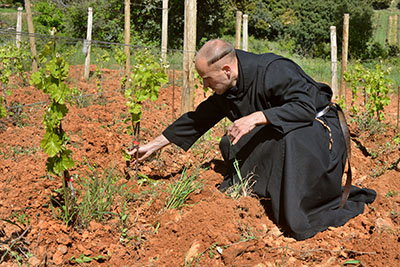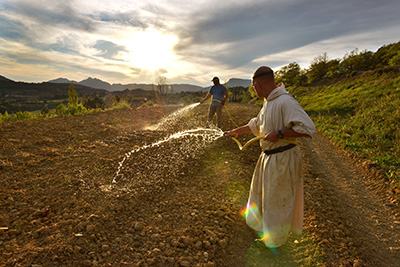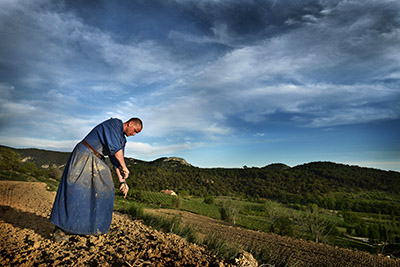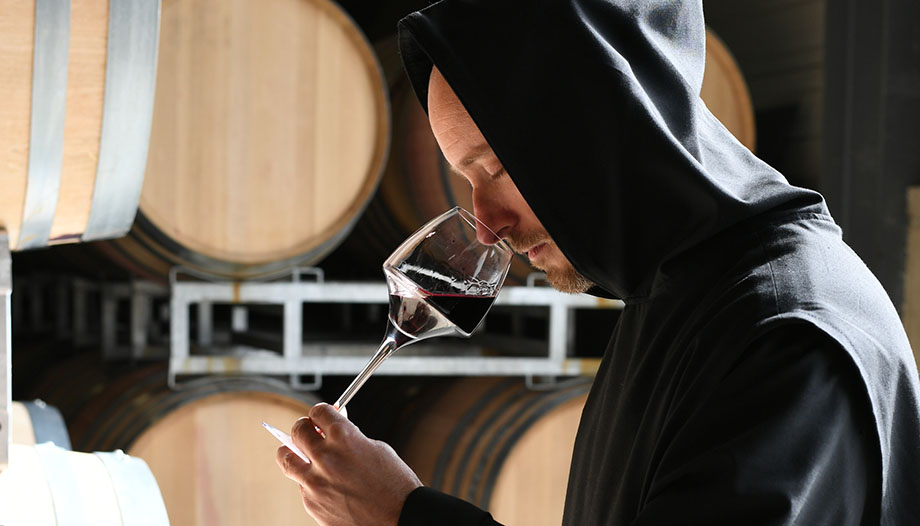As the president of the French Wine Academy, Jean-Robert Pitte, points out, the history of good wine in Christian Europe is deeply linked to monastic life. "Since the High Middle Ages, communities have wanted to pay homage to God through the splendor and delicacy of their wine, as well as through architecture, liturgical chant, calligraphy and illumination."
The Benedictine Abbey of Barroux is one of the few French monastic communities that have chosen viticulture as manual labor. "It is the spirit of charity that is at the origin of these wines, insofar as the monks became aware of the difficulties faced by the region's winegrowers; and moved by a spirit of charity, in the sense of the evangelical 'agape', they came to the aid of the winegrowers," explains in this interview with Omnes the director of Development at Via CaritatisGabriel Teissier. However, the pandemic has negatively affected the activity of Via Caritatis, which is launching a special sales operation, adds Teissier.

Jean Robert Pitte refers to the Gospel episode of the wedding at Cana, and writes: "As he demonstrated at Cana, Jesus loved good wine to the point of making it, the day before his death, together with the bread, one of the species of the Eucharist. The countless references to the vine and wine that mark the Bible demonstrate quite well that a good wine is like a prayer of praise addressed to God."
"This is the reason," he adds, "why 'Moines du Barroux' decided to join forces with Caritatis winemakers and excellent professionals to advance its wines and participate in the march towards excellence of the beautiful Ventoux appellation. Its magnificent high altitude terroirs allow the production of noble and lively wines".
Gabriel Teissier talks to Omnes about the history of these papal vineyards at their origin, the spirit of charity that surrounds Via Caritatis wines ("God chose wine as a sign of his love for men"), and the help they seek to move forward and support winegrowers.
̶ ¿How and when did the monks of the Abbey of Saint Madeleine de Barroux choose viticulture as a manual work?
The history dates back to 1309, when Pope Clement V decided to plant the first papal vineyard, in the Benedictine abbey of Groseau, on the slopes of Mont Ventoux. The monks ceded their abbey to the Pope and settled in the neighboring abbey of Sainte Madeleine.
In 1970, more than 600 years later, Benedictine monks returned to the region and rebuilt an abbey of Saint Madeleine in Barroux, very close to the old abbey.
Dom Gérard, the founder of Barroux Abbey, wanted the monks to have a life rooted in working the land. Therefore, they bought agricultural land around the new abbey and began to cultivate it. The main crops in the region are vines and olives, the monks became winegrowers but they also cultivated olives and made a mill to make oil.
Faithful to the tradition of monastic vineyards, the monks cultivate their vineyards with great care and develop a great expertise. In 1986, the nuns moved to Barroux, near the monastery of men, and took over a wine estate. Their land completes the monastic domain with very qualitative terroirs.
The history dates back to 1309, when Pope Clement V decided to plant the first papal vineyard at the Benedictine abbey of Groseau.
Gabriel Teissier. Via Caritatis Development Director
After 40 years of "haute couture" work, the monks have succeeded in revealing the exceptional potential of their high-altitude terroir. Many wine lovers ask them to increase their production and develop their distribution.
̶ Then they joined the neighboring winegrowers...

Indeed. At the same time, the monks witness the great difficulties of neighboring winegrowers who share the same mountain terroirs as they do, and who often do very high quality work but cannot make a good living from their work because of the high production costs and low selling prices for Ventoux appellation wines.
Then, the monks suggest to the neighboring winegrowers to join forces to make great wines together, under the direction of Philippe Cambie, named best winemaker in the world in 2010 by Robert Parker. These are the wines Via Caritatis.
Why have you chosen the spirit of charity as the message of the Caritatis wines? It is a beautiful thing.
It is the spirit of charity that is at the origin of these wines, insofar as the monks, as we say, became aware of the difficulties suffered by the winegrowers of the region. And moved by a spirit of charity, in the sense of the evangelical agape, they came to the aid of the winegrowers.
St. John, in his first letter, says: "If I see my brother in need and close my heart to him, how would the love of God be in me" (cf. 1 John 3:17). Charity comes from God, God is charity. And contemplating the goodness of God every day in prayer, the monks naturally wanted to make it shine around them.
Beyond the fruits of the vine itself, transformed into high quality wines, the monks see true fruits of conversion in the hearts of men. The message of Charity is also the very symbol of wine. In fact, God chose wine as a sign of his love for mankind.
The monks became aware of the difficulties faced by the region's winegrowers and came to their rescue
Gabriel Teissier. Via Caritatis Development Director
̶ The monks want to help the people and communities that have suffered from the Covid 19 pandemic and seek to enhance the activity of Via Caritatis. Is this true?
The activity of Via Caritatis has been particularly affected by the pandemic, and more particularly by the long periods of confinement, which have drastically slowed sales.
We have therefore launched a "special sales operation" to enable us to compensate for all the sales that could not be made due to the numerous confinements, in particular to the restaurants that were closed, which make up the majority of our customers.
This operation is still ongoing, and we need everyone's help to support this project that combines excellence and charity. You can watch this video, for example, at Frenchand also in English.
̶ Can you tell us about the wines, do you export to other markets?
Our wines are typical of the Rhône Valley, with lots of crisp and sweet-toothed fruit, and grape varieties typical of the Southern Rhône Valley such as Grenache, Syrah or Cardigan for the reds or Clairette and La Rousanne in blanc, but also has a lot of freshness due to the altitude of our vineyard. This freshness is really characteristic of our terroir even though we are only a few kilometers from Gigondas and Châteauneuf-du-Pape.

We export wines to almost all continents, especially Europe, the United States and even Asia. On the other hand, we are still poorly represented in Spain and South American countries. Therefore, we are looking for good importers in these regions to promote the charity's wines!
We conclude the conversation with Gabriel Teissier, Development Director of Via Caritatis. In their institutional message, they underline that "Caritatis wines want to be ambassadors of the best that the history, wine and terroir of Provence have to offer. Above all, they want to participate in the diffusion of a Spirit of Charity which is the true land of their birth".
As Amaury Bertier, from the administration area, says, "unfortunately we don't have a salesman in Spain, but if your article can raise vocations, it would be a blessing! If anyone would like to purchase wines now, you can go to the website of the monastery".








